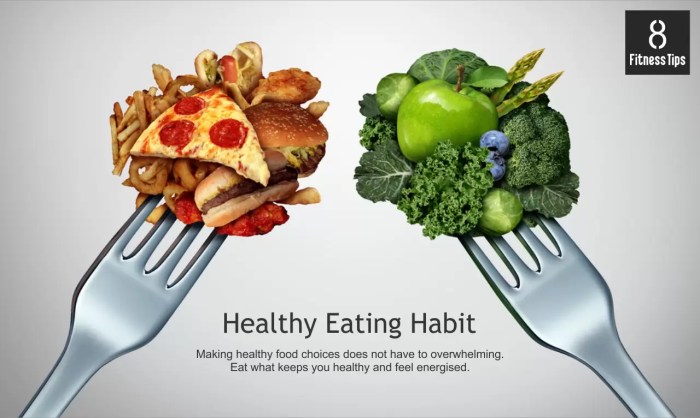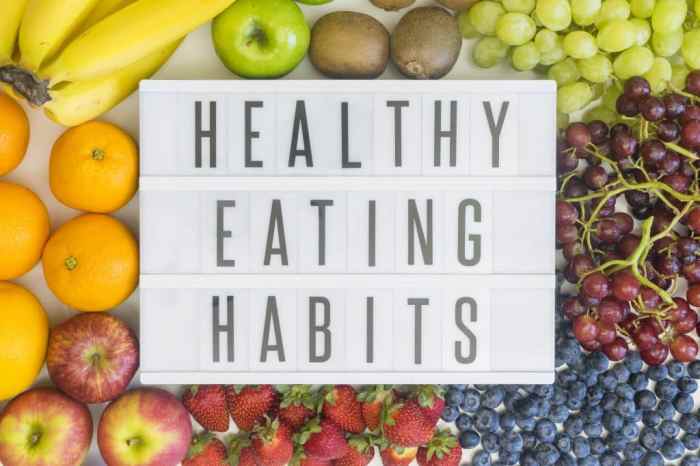Kicking off with Healthy Eating Habits, this topic is all about keeping your body in top shape with the right fuel. From the importance of a balanced diet to the impact on your overall well-being, get ready to dive into the world of nutritious eating.
Let’s break down the essential components of a healthy diet, explore tips for developing better eating habits, and tackle common obstacles that may come your way on the journey to a healthier lifestyle.
Benefits of Healthy Eating Habits

Maintaining a balanced diet is crucial for overall well-being. Healthy eating habits play a significant role in ensuring that our bodies receive the necessary nutrients to function properly. Good nutrition not only impacts our physical health but also has a profound effect on our mental well-being.
Importance of a Balanced Diet
- Eating a variety of foods provides essential vitamins and minerals that support overall health.
- Balanced meals help regulate energy levels throughout the day, preventing fatigue and promoting productivity.
- Avoiding excessive consumption of processed foods and sugary drinks reduces the risk of chronic diseases such as obesity, diabetes, and heart conditions.
Contribution to Overall Well-being
- Healthy eating habits can enhance mood and mental clarity, contributing to a positive outlook on life.
- A balanced diet supports a strong immune system, reducing the likelihood of falling ill and aiding in faster recovery from illnesses.
- Proper nutrition is essential for maintaining healthy skin, hair, and nails, enhancing overall appearance and self-confidence.
Impact on Physical and Mental Health
- Good nutrition plays a crucial role in maintaining a healthy weight, reducing the risk of obesity-related health issues.
- Adequate intake of nutrients like Omega-3 fatty acids and antioxidants can improve cognitive function and reduce the risk of cognitive decline.
- Healthy eating habits can alleviate symptoms of anxiety and depression, promoting mental well-being and emotional stability.
Components of a Healthy Diet

Eating a balanced diet is essential for overall health and well-being. A healthy diet consists of a variety of nutrients from different food groups to ensure optimal functioning of the body.
Essential Food Groups for a Balanced Diet
- Fruits and Vegetables: These are rich in vitamins, minerals, and antioxidants that help boost the immune system and reduce the risk of chronic diseases.
- Proteins: Protein is crucial for building and repairing tissues in the body. Sources of protein include lean meats, poultry, fish, beans, and nuts.
- Carbohydrates: Carbs are the body’s main source of energy. Opt for complex carbohydrates like whole grains, fruits, and vegetables for sustained energy levels.
- Fats: Healthy fats like omega-3 fatty acids are important for brain function and heart health. Sources include avocados, nuts, seeds, and olive oil.
Significance of Including Fruits and Vegetables in Meals
Including a variety of fruits and vegetables in your meals provides essential vitamins, minerals, and fiber that are crucial for optimal health. They help in maintaining a healthy weight, reducing the risk of heart disease, stroke, and certain types of cancer. Aim to fill half your plate with fruits and vegetables at every meal to ensure you’re getting a good balance of nutrients.
Role of Proteins, Carbohydrates, and Fats in a Healthy Eating Plan
- Proteins: Proteins are the building blocks of the body and are essential for growth and repair. They also play a role in hormone production and immune function.
- Carbohydrates: Carbs are the body’s primary source of energy, especially for high-intensity activities. Opt for whole grains, fruits, and vegetables for sustained energy levels.
- Fats: Healthy fats are important for brain function, hormone production, and absorbing fat-soluble vitamins. Choose sources like avocados, nuts, seeds, and fatty fish for a well-rounded diet.
Tips for Developing Healthy Eating Habits
Developing healthy eating habits is crucial for overall well-being. Here are some tips to help you get started on your journey to a healthier lifestyle.
Meal Planning and Preparation
Meal planning and preparation are key aspects of maintaining a healthy diet. By planning your meals in advance, you can ensure that you have nutritious options readily available. Here are some strategies to help you with meal planning and preparation:
- Plan your meals for the week ahead of time, including breakfast, lunch, dinner, and snacks.
- Make a grocery list based on your meal plan to avoid impulse purchases of unhealthy foods.
- Prep ingredients in advance, such as washing and chopping fruits and vegetables, to make cooking easier and quicker.
- Cook in batches and store leftovers for future meals to save time and ensure you always have a healthy option available.
Incorporating Whole Foods, Healthy Eating Habits
Whole foods are packed with essential nutrients that are beneficial for your health. Here are some ways to incorporate more whole foods into your daily meals:
- Choose whole grains like brown rice, quinoa, and whole wheat bread over refined grains.
- Include a variety of fruits and vegetables in your meals to ensure you’re getting a range of vitamins and minerals.
- Opt for lean proteins like chicken, fish, beans, and tofu to fuel your body with essential nutrients.
- Snack on nuts, seeds, and yogurt for a healthy and satisfying option between meals.
Staying Hydrated and Limiting Sugary Beverages
Staying hydrated is essential for overall health and well-being. Here are some tips to help you stay hydrated and limit sugary beverages:
- Drink plenty of water throughout the day to stay hydrated and support your body’s functions.
- Avoid sugary drinks like soda, energy drinks, and sweetened teas, as they can add empty calories to your diet.
- Opt for water, herbal teas, or infused water with fruits and herbs for a refreshing and healthy alternative to sugary beverages.
- Limit your intake of alcohol, as it can dehydrate your body and add unnecessary calories to your diet.
Common Obstacles to Healthy Eating: Healthy Eating Habits
Adopting healthy eating habits can be challenging for many individuals due to various obstacles that may hinder their progress towards a nutritious diet.
Busy Schedules and Convenience Foods
One common obstacle to healthy eating is the impact of busy schedules on dietary choices. Many people find themselves constantly on the go, leading to a reliance on fast food and convenience foods that are often high in unhealthy fats, sugars, and calories.
- Fast food options are convenient but typically lack essential nutrients needed for a balanced diet.
- Processed snacks and meals are readily available but can contribute to weight gain and other health issues.
- Time constraints may lead individuals to prioritize convenience over nutritional value when making food choices.
To overcome the challenges posed by busy schedules and convenience foods, individuals can consider meal prepping, planning ahead, and choosing healthier grab-and-go options like fruits, nuts, and pre-cut vegetables.
Budget Constraints and Food Costs
Another obstacle to healthy eating is the perceived high cost of nutritious foods compared to cheaper, less healthy alternatives. Many people believe that eating healthily is expensive and unattainable within their budget.
- Fresh fruits and vegetables are often viewed as costly options, leading individuals to opt for cheaper processed foods.
- Organic and specialty ingredients can come with a higher price tag, deterring some from incorporating them into their diet.
- Limited access to affordable healthy food options in certain areas can also pose a challenge for individuals looking to make better dietary choices.
To address budget constraints and food costs, individuals can explore local farmers’ markets, buy in bulk, prioritize seasonal produce, and look for sales and discounts on healthy food items.
